#and only talks about utena personally
Explore tagged Tumblr posts
Text
i just saw someone call shiori a straight woman in an article....
#did u watch her black rose ep. that girl is NOT straight#i mean they refer to shiori being cruel and 'mockery' ig. that's how they read it#a russian taunt if you will#anyway i was out of curiosity specifically searching 'trans male reading of rgu' because i wanted to know if any were out there#and it gave me so far a number of articles that will be like 'it challenges gender!' and then doesn't elaborate#and only talks about utena personally#also someone trying to be like 'hmm the egg in utena... egg is a slang term for some trans people...' with no follow up#babygirl that's funny but not what it's about#current article awkwardly refers to 'utena's more-masculine-than-feminine self' but never even brings up the word butch#let alone anything in the trans direction#ALSO they say 'there's dubious consent but sex is never shown onscreen' I THINK IT KIND OF IS.....#anyway in conclusion i went through a bunch of articles nothing matched and i'm vaguely annoyed#i don't even usually interpret utena as transmasc but a lot of things about her narrative were incredibly resonant#same with anthy#and i expected at least... SOME results even if they weren't very good or deep#sigh#vic talks
18 notes
·
View notes
Text
I was wondering why I tend to more enjoy shoujo that predate the 2000s than contemporary stuff and at first thought it was history leaving the stronger works of past decades easier to find, but turns out there could be more than bias at play
Turns out there has been a censorship law since 2006 specifically targeting shoujo manga around sexuality. And suddenly the fact that shounen can get away with some much more content-wise than shoujo suddenly makes sense
#seasalt talks#seriously it clicked together so many puzzle pieces for me and just made me see red#like shounen can have panty shot and tiddies galore but it is shoujo that goes too far???#like I am personally strongly anti-censorship but even if you dislike the idea of 'young girls' reading about sex#but like iconic shoujo works like Dear Brother or Nana or Mars are known for covering these topics#or like fucking Utena though I'm mostly familiar with the anime#but I noticed that the original manga was published in shoujo while the anniversary one was published in a josei manga#granted this could be to follow the audience who grew up with the original that's fairly normal#but still i can only imagine what sort of chilling effect this could have had on shoujo creators
104 notes
·
View notes
Text

This is such a weird thing to say
#it's even stranger that those were rb tags on a gifset of the fight between touga/saionji and utena/anthy#Like idk which sword this one is calling a ''shortsword'' since they both seem pretty long to me but like#this is scaring me#who tf is the ''tma''??#who tf is the ''tme''??#Idk which is worse‚ mfs who say shit like ''The AMABs/The AFABSs'' or this#''This sword is giving 'Doesn't experience transmisoginy'! '' like WHAT!?#i can only hope the ''tma'' this person is talking about is Anthy and/or Utena bc that would make the whole thing slightly better#delete later
5 notes
·
View notes
Text
Is it just me or do people view Shiori solely through her black rose arc episode way more than they do the other black rose duelists?
#revolutionary girl utena#don't get me wrong she IS manipulative even outside of that arc. but like. she's not evil incarnate?#yall she doesn't even REMEMBER that juri is in love with her.#like. during the ruka episodes she is doing her normal 'project love for juri onto a boy in close proximity to her thing'#from her perspective juri has been acting extremely cold to her ever since she got back (deservingly because of shiori's past actions)#but then talks to her again ONLY to try to get her to break up with ruka.#we are mostly in Juri's perspective so we KNOW that she loves Shiori and that Ruka is genuinely harmful for her#but Shiori's reaction to that makes total sense!#I'm not even trying to argue she's a GOOD person#just like. y'all she is a high schooler with internalized homophobia who has no reason to believe juri is anything but cold to her#if you're not in juri's head it is VERY easy to see why shiori would come to the conclusion that juri looks down on her#rgu#people seem to think shiori has the same knowledge of juris psyche that the audience does#and that the black rose arc (which is all about troubled kids being manipulated to act on their WORST influences)#reflects her entire personality
30 notes
·
View notes
Text
Oh yeah..... midnight gospel be hitting.... sitting in my bed fuckin. Crying. Get a grip girl
#Its the trudy ep which is actually the episode that made me keep watching#I love love love this episode.....#Something about how.......... idk.... its a very profound ep that I can't explain and it's a nice cry#This ep kind of shaped my outlook on life especially after finding out about my friend dying#All the regrets and things left unsaid.... I make my peace daily by being really straight up#If I love and care about ppl I tell them... I say they are appreciated and cared for man#I am always thankful for people and I *love* people as a whole#And as long as the people around me intrinsically know that they are loved and cared for and cherished.... like that's it#That's the end game truly#I will never ever be sorry for that. This was THEEEE episode.#There's a lot of nuance behind my feelings best described by revolutionary girl utena#But still. I'm deep enough in my tags bc I'm crying over my s/o but not in a bad way#Fml I am so grateful to him as just an entity. As a person in my life even if our lives only intersect for this brief period of time#He hasn't been texting me much and we didn't talk much at work and I didn't even get a goodbye (rude lol)#But I know he was having a rough day. I know he needs a bit of tlc.#He could be on a downswing because I am certainly on an upswing#So I'm kind of like trying to focus on doing my own thing rn without worrying about it#Because I can't do anything about it so I might as well continue My Thang#But as I sometimes come to terms with us never talking again (gotta be prepared at all times to be ghosted)#I also come back to terms with needing him to really understand#how many people in his life depend on love cherish and admire him#And im not just talking about me... he has a lot of siblings and a not great mom. Two kids he loves.#He has always taken care of everyone else in his life#He deserves to really know and idk. It makes me think of this moment.#Realizing how much I dont ever want to question if he knows#I don't want to question if I could've done more or tried harder etc. I did my very best and didn't lie cheat steal or whatever#I am so grateful to him for letting me have that. Even if nothing can come from it in the end#Even if we should be torn apart!!!! Take my revolution!!!#Anyways. Here's wonderwall#Banger of an episode. Worth the rewatch
1 note
·
View note
Text
i'm still listening to the utena james somerton podcast. hey was this post a lil too prophetic in hindsight
"would more people watch utena if they knew gay men were in it" probably but i don't know if i could handle utena discourse from someone who only got interested once they discovered gay men were in it
#to be fair james is BARELY interested in the gay men of utena#the podcast opens with people theorizing about how much of the show he actually watched#and i personally am in the camp that he prob watched it while doing something else#otherwise i think he wouldve talked more about touga/saionji and akios relationship to. every man in the series lol#but the incredibly surface read of everything going on with juri/shiori and anthy/utena? yeah that tracks#its more of just a pattern of like. only assuming akio has interiority and complexity because hes a man with screentime#and assuming everything utena and anthy are on first glance is the summation of their characters#even though (ESPECIALLY FOR ANTHY) they only make sense as characters once you actually pay attention to them#posts by me
158 notes
·
View notes
Text
Fansub Release + Analysis of Utena Ep 14
This is a big one!!

My fansub release posts aren't usually like this, but this episode is so jam packed with stuff I want to talk about that I had to write my translation notes as a series of essays. It's longer than usual so strap in!
First, a word on “The Mikage Seminar”
I’ve always found the translation “the Mikage Seminar” very strange. In English, a seminar is an event — a lecture. Yet “the Mikage Seminar” is discussed as though it’s not a recurring lecture, but a society or a school of therapy, or a cult (like scientology). In fact I did a bit of reading about scientology to try and find an alternative translation, and discovered that the origins of scientology, namely a set of ideas and practices called Dianetics, bears a lot of similarities to “the Mikage Seminar”. Both involve a type of therapy where one person looks into their mind and talks to an “auditor”.
The auditor coaxes the preclear to recall as much as possible. — Wikipedia
This in particular stood out to me! Mikage often says 「深く。もっと深く」 during his interviews (”Deeper. Dig deeper.”).
The Japanese word ゼミナール doesn’t actually come from the English “seminar” but the German “Seminar” (capitalised). According to Wikipedia, in Germany, and often in Japan, Seminar/ゼミナール is used to refer to a university course that includes a thesis project. So ゼミナール refers to a course of learning, rather than a talk or lecture. And it would make a lot of sense to call a system like Dianetics a “course”. Almost like a “course” of medicine — a “course” of psychological practices that you can join but never complete.
So it would make sense to translate it as “the Mikage Course”. But “course” has more meanings in English than just this, and in the context of a university this makes it sound more like a mundane teaching course. So I tried some other words: the Mikage Sessions, the Mikage Method, Mikage Psychotherapy, Mikage Therapy, the Mikage Movement. None seemed quite right. Until I remembered this post. ゼミナール is a foreign word in Japanese, why not find a foreign word for the translation? And so I settled on this:
The Mikage Seminarium, AKA The Society of the Black Rose…
Seminarium is Latin, and is where both the German and English derive seminar from. Its original meaning is “seed plot”, but it’s also just the Polish word for seminar. I really like how the Latin makes its meaning ambiguous — it kind of sounds like a location, kind of sounds like a society, and kind of sounds like a learning course. Because it is all of these things.


Anthy: では、香苗さん。失礼します。 Kanae: ね、あたしの事、お姉さんって呼んでいいのよ。もうすぐわたしはあなたの本当のお姉さんになるんだから。
A more literal translation:
Anthy: Thank you for having us, Kanae-san. Kanae: Please… you can just call me “sister”. I’m going to be your real sister soon enough anyway.
The translation I ended up going with:
Anthy: Thank you for having us, Miss Ohtori. Kanae: Please... you can just call me Kanae. We're going to be family soon. There's no need for the formalities.
Japanese honorifics strike again!
In English, sisters-in-law don’t ask to be called “sister”. That would be super weird in most scenarios, and this scene is trying to evoke a particular familiar feeling of closing a distance gap in a relationship. The audience is meant to relate. Changing how Anthy addresses Kanae was pivotal to this scene working properly.


わかりました。あなたは世界を革命するしかないでしょ。
I understand. Your only choice is to force the world to change around you.
This line is translated as “Your only choice is to revolutionise the world” by basically every other translation. The reason is clear — the Japanese is the same as when Utena pulls the sword out of Anthy, or when any of the other characters talk about “revolutionising the world”. However, in this context, I don’t like it. The nuance of the English phrase is quite different to the Japanese phrase. In English, it’s often used to describe new commercial products: “This new device will revolutionise the world!” It comes with an implied “for the better”, but has used to describe technological developments so unexciting that it can also feel hollow. When the student council talk of revolutionising the world, they sound like revolutionaries — the context makes it work. But in this context, it comes out of nowhere and doesn’t have any of that fervour, which makes it sound hollow and flaccid when it should sound sinister and manipulative.
I think a pervading throughline for all the Black Rose duelists is that they see their problems as caused by other people, with themselves being blameless. Rather than change how they approach their situation, Mikage tells them they’re in the right.
Your behaviour will set you down a path. If that path leads to your goals, well done! However, if your path does not lead to your goals, there’s only two ways you can achieve them.

The first is to change your behaviour so that it does align with your goals. The second, impossible way, is for the rest of the world to change such that your current path DOES end up leading to your goals. This second way is not possible in the real world. But it is possible in Utena.

Also I’ll just leave this here: “around you” → “revolve” → “revolution” 👀
Kanae tried to build a relationship with Anthy in a passive, non-confrontational, extremely Japanese way — the way she has been taught to behave, the “proper” way, a mechanical following of the social scripts. We don’t see a lot of their relationship, but the way she behaved and spoke of behaving towards Anthy is very very similar to the way my Japanese grandmother has behaved towards my and my brother’s partners.
It was unthinkable to her to change this pattern of behaviour. Her only choice was to change Anthy, change the rest of the world, so that her behaviour would lead to the outcomes she wants. You could describe this forceful bending of reality to be “revolutionising the world”.


この黒薔薇のある限り、私はこれから嘘の私を演じなくて住む。
As long as I have this Black Rose, I'm free from the lie I was living before.
Besides gender, growing up, and resisting change (which exist as separate themes but also all intertwine as one), another major theme present in Utena is the self and subjective reality. The self is explored within those first major three themes, but also in terms of how the self dictates reality with the Black Rose duellists.
Black Rose Kanae says that her past self was a lie.
It reminds me of all the times when I’ve been going through a personal trial and I’ve looked back on my past self and thought “How naive I was. I understand things better now.” And then after a while I realise I was wrong, and my first self was more right. And then later still, maybe I re-realise that the second self was more right! And so on! The reality of truth (or to use Kanae’s language, “lies”) is so subjective.
Who dictates knowledge production? Who decides what is true; what is valid knowledge? This is a question of sociology - and at the moment that answer is "science does, kinda". But science and academic systems are supported by capitalist structures and tainted by capitalistic incentives — needing to be published in a journal, issues of replicability, the barrier to entry into academia in the first place, etc, etc. In the future we may find our current way of organising knowledge to be archaic and primitive in the same way we look back at medieval scholars.
But what about organising self-knowledge? Knowledge where the only one who can really decide what is true is yourself. And the only one that can decide what yourself even IS is yourself. I feel like I have looked back on my old ways of conceptualising myself many times (not even counting the gender-based revelations) and thought it primitive and archaic, and NOW I truly understand who I am and how to think of myself and how my thoughts interact with my other thoughts. But I have no doubt that I’ll look back on this current self of mine and reject their way of thinking too.
After their heart is replaced by the Black Rose, the duellists themselves frame this change as a moment of self realisation, of clarity. Once the rose is inside them, they wake up from themselves, like I have countless times. Kanae says herself, “This is the true me.” Honestly, I don’t doubt it. I think that version of Kanae was her true self at that moment, given the things influencing her. Being brainwashed doesn’t make you less of a person, or less yourself. It just makes you organise your reality differently.


心を凍結させて作っただけの間に合わせのデュエリストでは、彼女は破れないな。
We won't be able to defeat her by simply freezing someone's heart and forcing them to duel.
Anya and I discussed this in depth. I originally translated 心 as “mind”, because that was the first thing that popped into my head and I thought that was the simple part of the translation. However, Anya pointed out that it didn’t make sense with the themes of self and subjective reality, and I strongly agreed, so I changed it to “heart” instead.
Anya suggested “conscious mind” instead of “heart” but I think heart is more accurate. 心 (kokoro) can mean heart or mind in Japanese (I find it interesting that those two things are portrayed as opposites in English), and that kanji is found in the word for biological heart, 心臓 (shinzou). When they say of the Black Rose "This is your new heart" they use 心臓. They also say "Your new 命 (life/lifeforce)" which I translated as soul since it sounded more hardcore and because "your new life" is a set phrase in English meaning a new chapter in your life rather than your life force. I think the idea is that they're freezing the duellists' ability to love and feel empathy, which in my opinion is necessary for them to commit to the unbelievably selfish act of revolutionising/reconstructing/bending the entire structure of the world for their own convenience.

A very special thanks to @dontbe-lasanya for being there to talk through all these themes and ideas. I'm incredibly proud of this episode's translation and I wouldn't have been able to do it without them.
If you want to see more analysis like this, let me know! And also follow this blog to see episodes of the fansub as they're released. You can find all episodes released so far here:
Rose divider taken from this post
#revolutionary girl utena#rgu#shoujo kakumei utena#sku#utena#media analysis#utena analysis#translation#japanese#japanese language#langblr#official blog post#utena fansub
157 notes
·
View notes
Text
we watched the black rose musical last night and i'm still thinking about how much akio goes around just.. touching other characters, even in scenes he isn't actually really supposed to be part of. it's a really interesting directing choice. sometimes it's just a touch, like a hand on someone's arm or shoulder, but most of the time he's pushing people. very much like in the show, he is putting the actors (the characters) into the positions he needs them in. only here it's very literal. and instead of just telling them where to be, like a stage director might do, it's physical, hands-on, even kind of violent at times, yet still subtle enough that nobody notices. nobody ever reacts to it, they just move to where he needs them to be, stumbling into place and continuing to play their roles.
and i could talk about exactly who gets pushed when and to where (like how the first and last person he does it to is anthy-as-mamiya, how it's a light push, really just a touch to keep the momentum of what they're already doing going, as opposed to the way he kind of shoves other characters), but the thing that really stood out to me is that the only character he does touch but doesn't ever really push (aside from i think anthy, and i do have a lot of thoughts on the scene where they're dancing together that i may get into in another post) is utena. what he does instead instead is pull her.
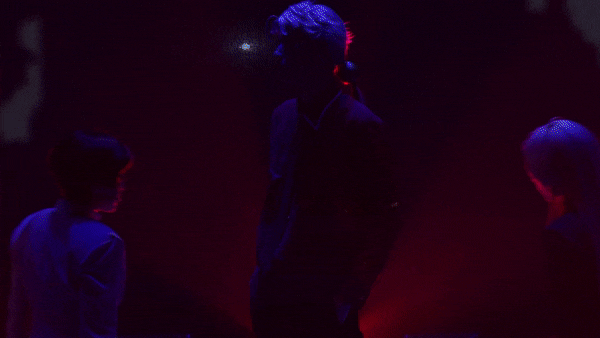
in the opening number, there's a moment where it seems like utena is about to walk off-stage (like tokiko does in the scene, because their choreography is mirroring each other. very clever), but before she can, akio grabs her arm and turns her towards the center of the stage instead, where she lies down in her "coffin". the show proper starts, of course, with the once upon a time story of utena meeting the prince, and a recap of the first arc/musical. and of course akio is the one who puts her into position for it. she's still trapped in her coffin.
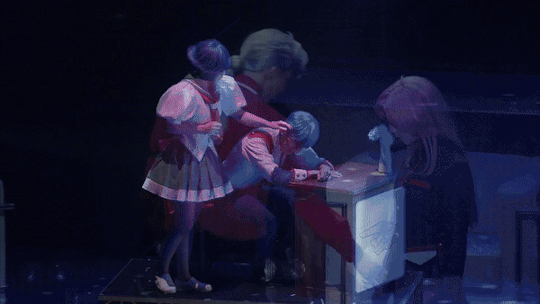
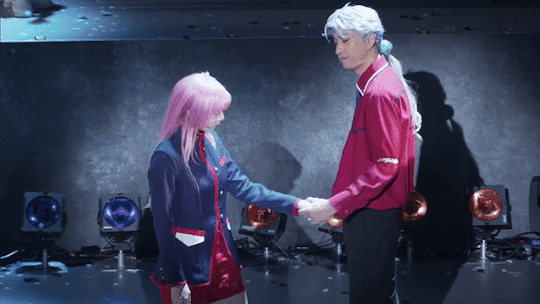
and, i don't know, there's just something especially unsettling to me about it compared to the pushing. maybe just that it's different from his interactions with every other character. or the contrast between the pushing being more direct and aggressive, compared to him subtly and gently guiding her around the stage, into the chair or closer to him. there's something horribly personal or intimate about it i guess, especially since he often takes her hand to do it.
#clawing at the walls again thinking about what they might have done with him in the third musical if it happened#expect more musical posting soon btw. it's such an excellent adaptation and i'm having many thoughts about it#revolutionary girl utena#analysis#akio#akio and utena#m
215 notes
·
View notes
Text
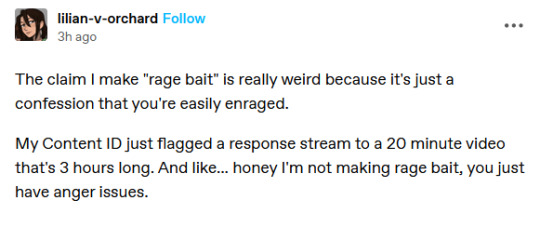
Lily is correct. She doesn't make rage bait. You'd have to be at least a little clever and actually plan out your video scripts to do that.
Lily's opinions are just so off-base, so deranged, so childish, so wrapped up in her own personal bullshit and delivered in that smug ass Ben Shapiro "I'm so right and smart and logical" style that it just stabs painfully into the brain of anyone with sense who hears them.
And aside from this strange deficiency she has when it comes to understanding narrative, she doesn't seem to fully watch or play anything she ever talks about!
Utena? Clearly didn't see it. She didn't even know the name of the villain. If she had watched it she'd have been screaming about the tone and either praising or deflecting on the three sibling relationships of varying degrees of incestuous in it.
Steven Universe? I doubt she's rewatched it since it aired. She constantly gets things wrong or is surprised by things that are in episodes. And the movie? I doubt she watched it beyond just a few clips. She went by a bunch of edgy Reddit fan theories, didn't know what any of the songs were actually about, and then kept disgustingly saying reset Pearl being a Pearl to Greg was gay conversion therapy and cut out Opal's entire existence to maintain that narrative.
Even Kingdom Hearts? Well mah boi Crim from my supporter Discord went over that one. Lily, supposed big mega fan of KH, tells you to just skip a bunch of the games. We now wonder if she's actually played them or only watched cutscenes.
youtube
241 notes
·
View notes
Text






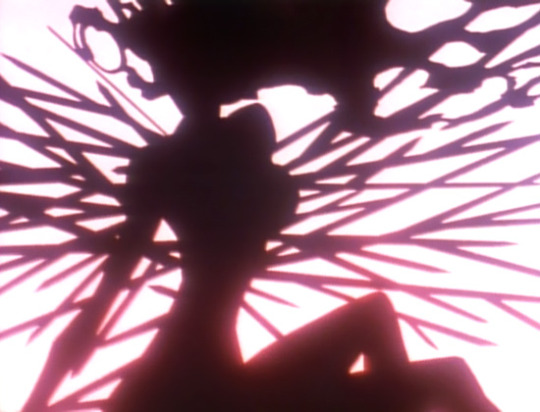
Shameful secrets cause a person to become haunted. She cannot sleep, for a shaming secret is like a cruel barbed wire that catches her across the gut as she tries to run free.
(Clarissa Pinkola Estés, Women Who Run With the Wolves)
the fact that no one* knew about akio's abuse of anthy is far from the only thing wrong with it, but the inherent shameful secrecy of it was an integral part of her abuse, something that significantly served to isolate anthy from her peers.
it was definitely akio's plan for utena to see anthy and akio at the end of ep. 36. (anthy's hands disappear into her hair = she had no hand in this. + the way the scene lights up like how lights come on at the beginning of a new scene in a play (anthy's previously black silhouette gaining color and features) = it was staged. not to mention her bleak expression) akio thought that utena would just be disgusted by her, and/or feel betrayed, and that would be that. however, he sealed his fate (anthy being able to ditch him) with this action, because utena offered anthy compassion and understanding instead of condemning her.
utena acknowledging anthy's pain as a result of being abused by akio touched anthy more than any of utena's other actions up to that point. while utena says a lot of stuff in that scene about utena's ego and being a prince, anthy only has visible reactions to two of utena's lines until utena is completely done speaking.
"And the night I learned about you and Akio...!"
the camera focuses completely on anthy, nothing else shown, as anthy slightly tilts her head up. there is no dialogue while anthy makes this small movement; anthy is listening intently for what utena will say next, and the show wants us to notice that.
"I thought that you had betrayed me. Even though you were suffering so much...!"
when utena talks about suffering- acknowledging that akio's treatment of anthy caused anthy pain- anthy uncurls her body significantly. a visual indicator of feeling less shame, immediately in that moment.
anthy does not move in reaction to anything else utena says until utena is fully done speaking, when anthy and utena are now shown kinda-holding eachother. utena may or may not know the full impact of her words, but it is clear to the viewers what moved anthy to say:
"It doesn't matter now. Just leave this school. Forget about everything that happened here!"
in anthy's opinion, this has to be the kindest, most honest thing she can say in this moment. utena leaving would ruin akio's plan and anthy would be the obvious reason why (likely leading to punishment), not to mention how anthy would obviously miss utena. the fact anthy said it anyway shows how impactful utena's statement was
it's good to talk about utena's obsessive girlprincing and how it was damaging. it's good that utena acknowledges it herself. but i think the fandom commonly overestimates how much that mattered to anthy, especially in relation to this scene. i feel that people sometimes abbreviate it as 'utena apologized to anthy for her egotistical behavior, and that brought them closer together!' like yes, she did and that was positive and indicative of utena maturing. but i do not think that was the most important aspect here
#rgu#anthy himemiya#women who run with the wolves#*(nanami and touga knew eventually but that's neither here nor there#if anything nanami knowing and treating anthy like even more of a weirdo for it would reinforce anthy's shame#not that i blame nanami. she is 13 and in hell)
330 notes
·
View notes
Text
Responding to Lily Orchard on Utena
So I already talked about how Lily Orchard never watched Revolutionary Girl Utena and doesn't understand it on my main blog, and now she's trying to invoke the arguments I've had with other morons who have never watched and don't understand Revolutionary Girl Utena. Discussion beneath the cut!
[Lily's Post]
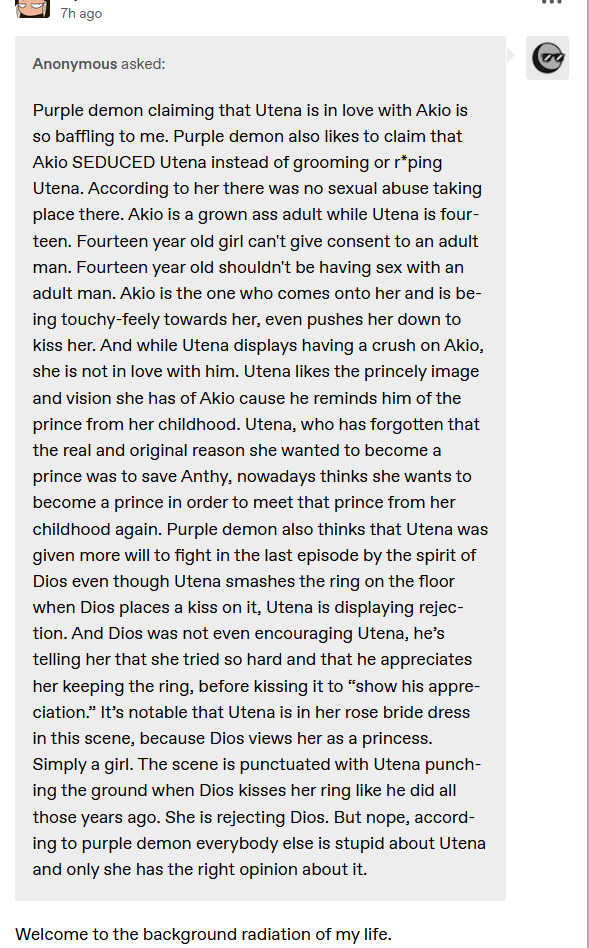
Here Lily and the little zoomers on Twitter who have never engaged with Utena beyond making a tumblr mood board, let me hold your hand through episode 33 The Prince Who Runs Through the Night from my "Let's Watch Utena" livestream from a few months ago. Uploaded unlisted:
youtube
Going "um sweaty she's a minor!!!???" instead of engaging with the actual text just stalls any meaningful discussion about the purpose of this episode within the narrative. Utena is a surrealistic piece that operates entirely on hazy dream logic. Trying to bring in real world ethics outside of the text into Akio's seduction Utena is simply irrelevant to what is being communicated. It would be like stalling every discussion about a revenge plot movie with "but murder is illegal!"
As I said on the stream Akio's seduction of Utena is Faustian. He is the devil pulling her further away from her gender role defiant values and her true purpose of saving Anthy from her eternal suffering, as she was spurred to do by the spirit of Dios. He is also using her because he thinks the Sword of Dios he can draw from her will be the key to opening the seal to the "Power of Revolution". But Akio can never regain the power of the Prince again, as he's a corrupt adult now. The ideal of the Prince that exists in both the hearts of Anthy and Utena.
This is a series you have to take within its own symbolic language. It is not interested in being realistic or straight forward. It's heavily influenced by experimental stage theater. Ikuhara purposefully wanted it to be tonally mismatched to put the audience in the mindset of the world.
On the next point:
I've been into Utena for 28 years. I've read lots of essays on it and have listened to many interpretations of it. I have no idea where this idea that Utena "rejects" Dios is suddenly coming from. I'll reiterate from the debate I had about this on Twitter:
Dios, the actual spirit of the ideal of the Prince, whose spirit she calls down during duels, who has only ever spoken to Utena in the space between life and death, appears here to Utena as the duel song chorus swells with "I exist! I'm here!"
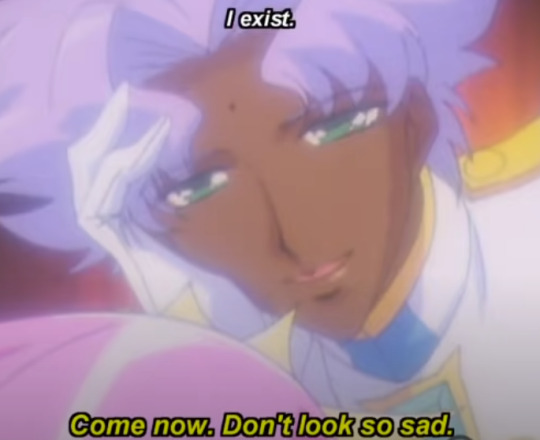
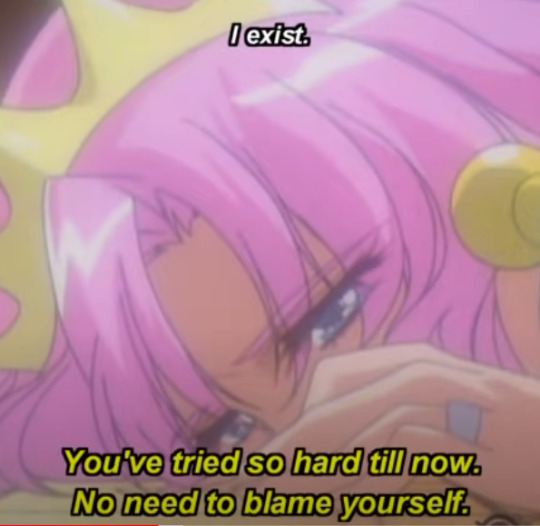
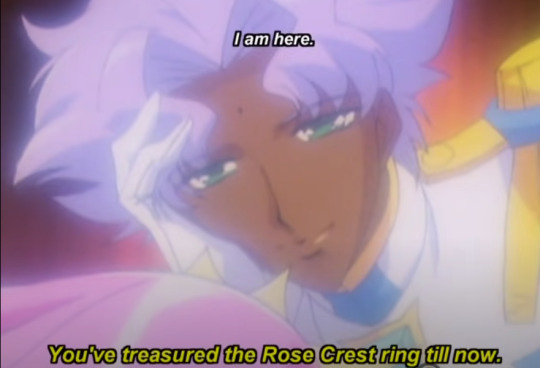
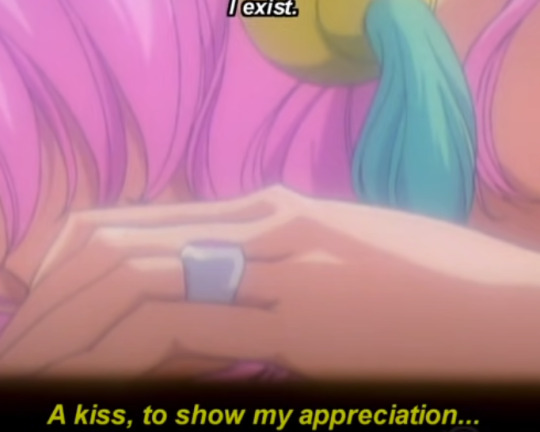
Dios kisses her ring
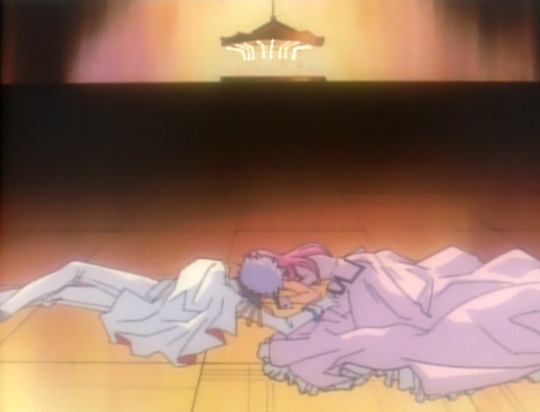
And Utena finds the strength to get back up.
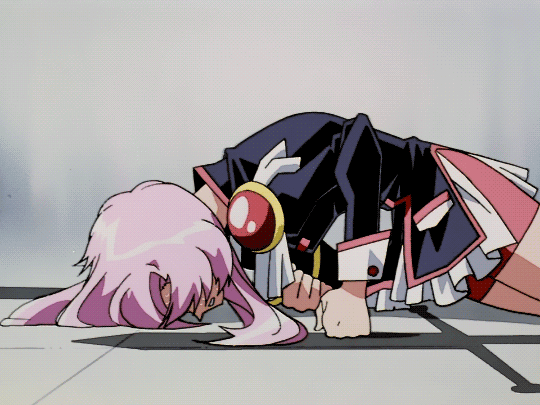
And when Akio is about to drain away the remainder of Utena's life? Dios, his presence completely unnoticed by Akio, quietly disappears behind the glass of pink liquid Akio is drinking. Never to be seen again. Dios has been Utena's ally throughout the entire show. Embodying the ideal of the Prince without having to be a prince is how she frees Anthy.
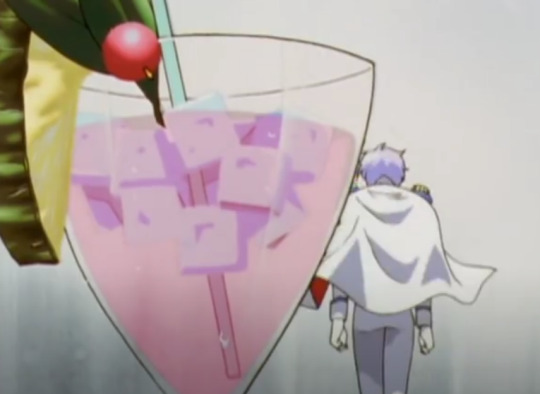
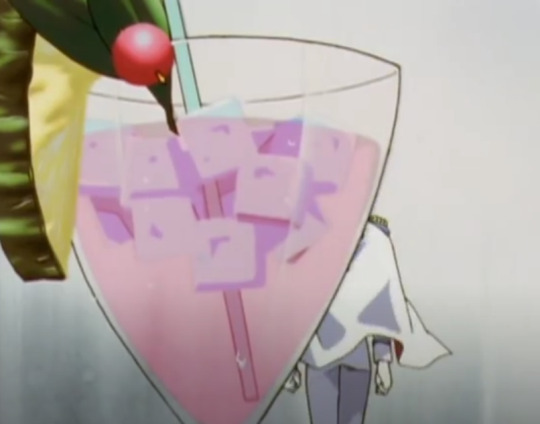
She puts her fist to the floor to lift herself up with the hand the ring is on. At no point does she "shatter the ring" as this person on Twitter tried to claim:
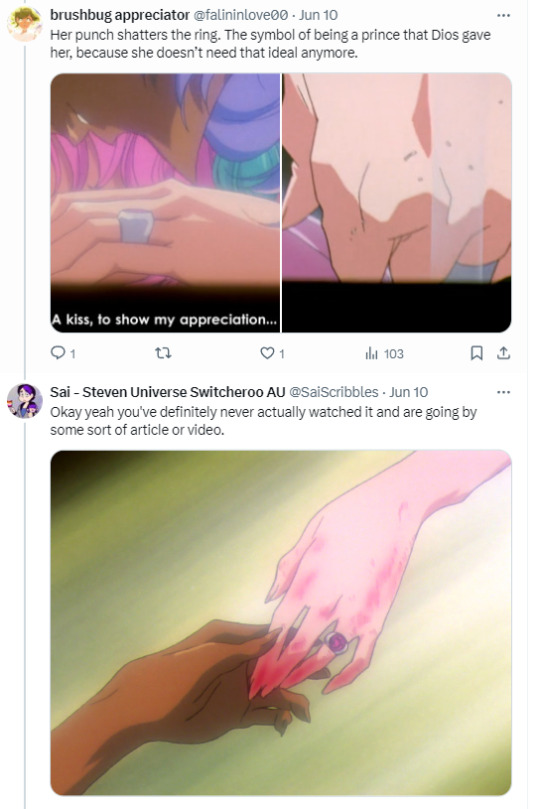
She has the intact ring still on for the rest of the episode. Because the ring represents her promise to free Anthy. You can watch the damn scenes yourself. The entire show is available on YouTube. I'd recommend watching the entire series first but here's the finale.
Wherever these painfully incorrect surface level readings of Utena are coming from please stop reading them and go to Ohtori.nu I beg.
69 notes
·
View notes
Text
Revolutionary Girl Utena and Epistemic Violence
or
Why Anthy is not a trans girl (but she is to me)
~~

Ohtori, as any good setting tends to, carries a lot of thematic weight. It’s a fairy world, where metaphorical illusion blurs personal hopes over a poisoned interior structure, to the point where an outside perspective may struggle to distinguish between what a character is thinking and what is actually happening. Time and memory are suggestions whispered in the ear of its students, a cyclic hell where the same puppets are played in position, memories broken but dreams intact, to test new victims and forge new swords. A kingdom of nowhen, ruled from above by a king that refuses to see that the prison he built cannot ever free him. A hierarchy where the misogyny taught to children to prepare them for the grown up version is baked into the very structure of the world, belying a culture of horrible sexual violence. And at the very bottom of that hierarchy, the victim-witch, is the kings own sister. A sort of broken Omelas, where one girl must suffer forever and ever, not to end the suffering of others, but to keep them in the dark. Especially her brother. What Ohtori is, and the hierarchies that it represents both within the work and outside of it, hinges on the suffering of that girl. And, maybe more importantly, her silence.
~~

Revolutionary Girl Utena changed my life. I’ve been saying this nearly two years now, mostly as a joke, but with distance I can see it really isn’t. When you are in the depths of an abusive relationship, it is extremely difficult to see what’s happening to you. I don’t wish to dwell on my own story here too much, but how can I ignore it? RGU was the language I used to understand what had happened to me. Images from the show flit through my mind as though I were a Tamarian. Utena, in the window. Anthy, with the candelabra. Utena, her hands cut with thorns. Anthy with the white beret. After finishing the show for the first time I felt sickened. Not merely because of the subject matter depicted, raw and horrible as it is, but because I saw myself in it. Why do I feel such a kinship with Anthy?
I think, dear reader, you may be able to imagine the horror inherent to that realization. You might have felt it, you may be feeling it now.
It seemed obvious to me then, for reasons I could not begin to fathom, that Anthy was a trans girl. Reeling from my first watch, this felt like the only conclusion I could draw though I couldn’t tell you why. For years, I have drafted and redrafted essays attempting to justify this feeling. Recently, I posted an reading of Miki as a transfem character, and I don’t feel particularly strongly about that reading! Sure, aspects of his character were relatable to me, I could draw analogies well enough, but that was completely secondary to my actual goal. Practice for the transfem Anthy essay. Looking back on what I’d written now, I don’t. Hate? What I wrote. There’s definitely some aspects I’d repudiate now. If you enjoyed reading it, if it meant something to you, I’m glad. But even as I was writing it it felt incomplete and limited. And I believe I understand why.
What did I get wrong about Miki and Kozue? What lies in Ohtori’s heart? What lies in that bed of rotten rose petals?
We all know what does, but we do not want to see it and certainly don’t want to talk about it.
It’s Nanami’s disgust with Anthy, with herself. It’s Miki and Kozue’s confused but earnest posturing. It’s Utena looking up at Akio, it’s Anthy’s vacant stare.
Even here, I’m speaking in abbreviated reference. But it’s abuse, sexual, at times incestuous abuse, that touches every character in RGU.
I’d recently seen a few posts which I think hit on a really common phenomena among fans of the show. Our own stories, our own disgust, our own fears and our own traumas, sort of get in the way when we talk about RGU. I think it’s a natural consequence. RGU deals with heavy subject matter that is very difficult to sit with. I don’t think it’d be incorrect to say most western fans of RGU are queer in some way. We’re much more likely, as consequence, to suffer from interpersonal abuse. And naturally, we are drawn to these characters since they represent, with so few holds barred, some of our worst experiences. But does that make them like us?

For the record, I think it would be ridiculous to suggest that RGU isn't a queer show and that it isn't filled with queer characters. But, for as obvious a conclusion as this is, a surprising depth of that queerness is veiled in subtext. It’s worth considering, the endless arguments over whether Anthy and Utena are lesbians or bisexual, is sort of inconsequential. The important thing is that they have escaped, together! We could suppose that, were Ohtori a real place, we could go track down the two of them and demand from them an answer. How do you feel, Anthy, about your attraction to Akio? What does that mean to you? Would you please quell that horrible disgust we feel thinking about it? Inquiring readers would like to feel better know!
When one leaves Ohtori, one leaves the view of the audience. Utena and Anthy are in love with one another, but what that means to them (and themselves) is out of our reach.

And yet, I can’t seem to shake my original conclusion, from my first watch. Surely it cannot be intended! Hell, even the fact that Anthy is desi is sort of incidental to any commentary on social injustice, the motivation for depicting her (and Akio) this way was to exoticize them relative to the rest of the school. So is this image of Anthy as a brown trans girl, her position in Ohtori being a result of transmisogyny, some western myopia? Mere projection of the aggrieved self on a character who, by her nature, absorbs the feelings and impressions of those around her?
Sort of?
Revolutionary Girl Utena was created in a Japanese cultural context, to be sure, but it’s worth noting that while the precise execution of (trans)misogyny and other gender injustices may vary from culture to culture, patriarchy isn’t exactly exclusive to the west. There is a lot of different directions we could run in here, but the one I want to focus on is epistemic violence (a good primer linked here if the term is unfamiliar). *
In Ohtori, all girls are like princesses, unless they are like witches. And, sooner or later, all girls are like the rose bride, the doll-witch, the synthesis. This is how patriarchy works. There is a concept of “permissible” femininity, and an “impermissible” feminity. There is the wife, the mother, the domestic servant, who is permitted some limited social power by her utility to a patriarch (primarily as a mother to trueborn children). Then there is, well, everyone else. “Loose” women, sure, but also those who have been damaged by sexual violence. Those who cannot bear children, because of some accident of their physiology. These women are used, for feminized labor, for sex, but because of the stigma associated with them and the issues they present toward patrilineal succession, they are subject to various censure. One does not talk about survivors of sexual violence or sex workers in polite society. It is possible for some to travel between these two categories, although it is far, far easier to go from “type 1” to “type 2” than the other direction. Indeed, for some it is not possible to have ones “virtue” restored. If we aren’t being reduced to predatory inhuman monsters, trans women, both a hypersexualized object of intense fetishization and incapable of bearing children, are placed into the second category automatically. Lots of would be abusers are happy to whisper in our ears, that they will treat us like we are “type 1”, but invariably they do not.**






The most maddening thing to me about being a trans woman is this, inability for anyone to see the violence that happens to you. People don’t believe you can be the subject of (sexual) violence, even though the fact it occurs to you, regularly, should be obvious to anyone who thinks about how we are perceived for just a moment! You cannot speak up without sounding delusional, it can happen right in front of a stranger, your best friend, and they wont bat an eye. That you are so incredibly disgusting, no one would want to hurt you that way.
Anthy isn’t a trans girl. But the system that silences her, treats her like she deserves her victimization, that she is irrevocably tainted by her relationship with Akio, the system that keeps us, the audience, from internalizing the dreadful truth of her character, this veil of silence, of covered ears and closed eyes, is extant in the lives of all misbegotten gender-oppressed rejects. If we are going to draw analogies between ourselves and Anthy, or Utena, or Nanami, or any the rest of them, we need to pull back that veil. Indeed, it's confronting (and then escaping from) that choking, word-stopping bile that sits at the core of RGU's thesis. I don’t think it’s wrong for us to relate to the characters in RGU, and write about that. But we might stop to consider why before we do!
*If you’re curious to read more about patriarchy across cultures, here is a really incisive article on the phenomena of third sexing, the operation of (trans)misogyny and gendered violence in parallel across cultural contexts, and how that relates to the western and desi sphere (but also more broadly).
**It should also be noted that there can be no comparison of suffering of anyone under patriarchy. Even the most vaunted cis man, I suppose. But there can be a comparison of power, and this is why we discuss it rather than throw up our hands.
Thank you for reading, I think this is the last I'm going to write about RGU for a while, though there's quite a bit I want to say about Utena and Anthy's relationship. So someday, I'll get around to more! And a perennial thank you to @empty-movement for the high quality archival images.
55 notes
·
View notes
Text
👁️👁️🔂👁️👁️👁️👁️👁️👁️
cringe at myself.....,.....
im aa FOOOOOLLLLLLLL 🫥
Sometimes i think, im a real artist or something..
But whats even real about me? everything i do only exists online
majority of it being on TUNBLR of all places.
fragile fucking tumblr.
my entire life is my imagination and fantasies my entire life is a thoughtform. how can i be a real artist if im barely even a real person in "reality".
not even banishedgirl but intangible girl.
The other day, when i posted about how i want to use the inter net less but im too lonely to stop, i feel it came back to bite me today, in a way i didnt want at all, for the short time my blog was gone, and this brought to my attention, how truly deeply foolish i am
i could disappear so fast like nothing because its all just 👉🧠💭 up here
Even tho my blog is back now. i cant get that feeling off of me. Like yeah there no reason my blog would actually be deleted, unless you know like, tumblr just got discontinued as a website. Which is not an unlikely scenario. i often wonder how long they'll keep paying for these servers. We saw what happened with myspace...
if tumblr was gone, id really be GONE gone
like. i dont exist.
sick to my stomach all day. even if i export my blog and put it on a hard drive ... does it even matter? it literally is not even "matter" it is pixels it is thin air.
How do i be a real girl in the real world
in utena , the "real world" is actually all an illusion. and i believe that to be true for our world too. In a way ive always believed my fantasies and spirits are more real than my body
But i still do want to exist here. i almost have to live in denial about this to stay sane. But i want to exist forever. i want a normal life and friends. i want normal things.. its disgusting.. i feel sick!!!!! im so happy but im so miserable. i love myself but im so insecure. i dont understand anything. i resent fakeness but im fake too. im all just words and space and airy air air
How do i change my life how do i stop yearning to Prove that i exist..... Why do i want to prove it so bad
WHY DID I HAVE TO BE CONFRONTED W THIS TODAY WHAT AM I BEING CALLED TO DO
Like dude i am already going thru it lately. i didnt need any more crisisfuel.
IDK i have to believe its some kind of catalyst to save myself , lest i succumb to the void
it has to show me something i needed to see.
Stuff like this makes me want to disappear in a way that i have total agency over. (Not like in a killing my self way but just in a going away way.) Thats not practical though is it i know thats my evil side talking.
trapped in a sticky web trapped in this glue trap thats what gets me all defiant.
the book im reading rn is from the 70s. i wish i was writing books not posts... i wish i was meeting people in real life the way the author describes in the book. I know the vainly imagined past doesnt hold all the answers either. Good chance i wouldve been institutionalized for woman hysteria or st. But i dont like whats happening here i dont feel natural at all. And its not just me who feels it, clearly.
if only i could be the one who finds comfort in impermenance.
do i accept what im dissatisfied with, do i try to change, or both, or neither?
i am sad
i am existentially disturbed
and i am fucking arrogant 🥴
for wanting to be real.
FUCK!!!!! ME!!!!!!!!!!!!!
🤮🤮🤮🤮🤮🤮🤮🤮🤮🤮🤮
26 notes
·
View notes
Text
Revolutionary Girl Utena spoilers.
I think what guts me the most is how Utena tries to rise above the mistakes of others, tries to do good, tries to be kind in the name of becoming like the prince she was inspired by...... only to fall short just like everyone else.
She's hypocritical, willfully ignorant, insufferable, malicious even.
When confronted by others who reflect her worst qualities, she tries to defeat them, tries to tell herself that she's not like them at all, when in fact she is all of them to some degree.
The fact that she's "trying to do good" doesn't even make her special or morally better. Lots of well-intentioned characters try to do good in the show, and try to break the rose-tinted windows of their cages. They still end up hurting others, willfully or not. So does Utena.
Utena also tries to drive change, but so does everyone else. All everyone manages to do is reinforce the status quo.
Is Utena a bad person? No.
Is Utena a good person? She's trying, but again that doesn't make her any less malicious than anyone else.
I think what ultimately sets Utena apart is her pursuit for honesty.
Honesty isn't something that's talked about in the show in the most explicit way, and why would anyone talk about it? To be honest is to make yourself vulnerable and open to abuse. To seek honesty is to shatter the lies that offer comfort and confidence, and expose the ugly, dirty little truths underneath. It's to break the rose-tinted windows of their cage: it's painful and sharp and cold and the cuts will be deep and will they even heal?
Utena is honest to a fault, making her susceptible to manipulation and mind games. She's also DIShonest to a fault, therefore perpetuating the illusion that continues to harm Anthy (but it's hard, isn't it, when that illusion is the reason you're still alive?). Utena being naive also has trouble perceiving truths that others more experienced can see.
However--while everyone else resorts to deflecting blame, mind games, or neglecting the inconvenient truth--in the end, Utena continues to pursue truth and be truthful. Not out of naivety like in the beginning, but knowing full well that it's a hell-ridden road worth walking.
She doesn't want illusions and deceit to lull her into false grandeur anymore. She doesn't want to see herself or anyone else through rose-tinted lenses, because to live a pretty lie is to die without being born. She eventually becomes honest with herself, sees the ugly truth of her flaws, and confronts them. She refuses the final illusion Akio offers her because it's dishonest to who she is and what's really important to her. She becomes honest with Anthy, and when Anthy is finally honest with her, Utena receives it in full however much it hurt.
In the end, she didn't save Anthy, because the truth is that Anthy was never hers to save. But by shattering the lies between them, and baring her truth, Utena became the vehicle for Anthy to save herself.
And that is revolutionary.
#i have words about this for the movie too but this post is long enough#utena thoughts#revolutionary girl utena#anthy himemiya#utena x anthy#shoujo kakumei utena#utena tenjou#utenanthy#rgu#sku#akio#analysis
440 notes
·
View notes
Text
Mikage: Boy of the Black Rose
I've long struggled to write about Mikage, who I find to be an intriguing yet elusive character. or rather, his character is understandable--his motives and feelings are communicated clearly enough--but his narrative is one of the most inexplicable in RGU. thinking it over tonight, I put my finger on one aspect of the Black Rose arc which I previously didn't know how to approach: specifically, Mikage's relationship with the Boys of the Black Rose.
the boys act as a kind of collective character, a mass of faceless people who whisper in dark corners. since RGU is about social reality, it often uses extras to deliver exposition or set the mood. the Shadow Girls are meta characters, existing somewhat outside the narrative, but regular schoolgirls at Ohtori can serve a similar purpose. they might demonstrate that Touga and Saionji are considered the hottest boys in school, or gossip about Ruka and Shiori's recent breakup.
the Boys of the Black Rose are slightly different, maybe a little closer to the Shadow Girls. rather than acting as bit characters in the larger world of Ohtori campus, I believe their existence is contigent on Mikage. while this could be put in various ways, in the most straightforward terms, the writers created them to help reflect on Mikage's character.
only one Black Rose Boy is given a face: the first one Mikage (Nemuro) talks to. when Mikage asks not to be called "professor," since they are the same age, the boy replies:
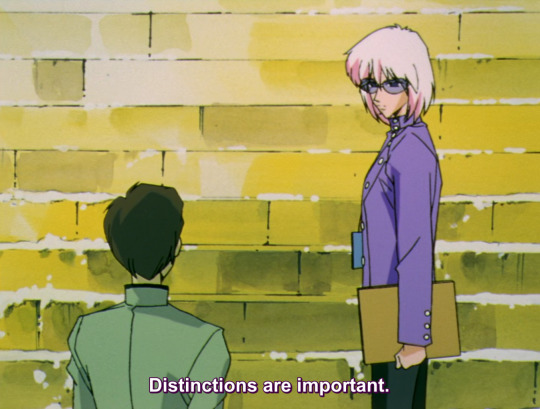
obviously, RGU relies on making its main characters visually distinct from "normal people." Wakaba calls them "special" and resents them. Utena is popular for her specialness, well-liked; in contrast, Mikage is an outcast for his. for a person to be special or a genius, there must be others for them to stand in opposition to. Mikage is set apart from his peers by his pink hair, by his unique uniform, and by being a professor.
after Mikage is introduced to his new work, the boys begin to gossip about him, saying he knows nothing about what's really going on at Ohtori. towards the end of this conversation, there's a shot of Mikage, and then he actually replies from the future to the gossip they were spreading about him.
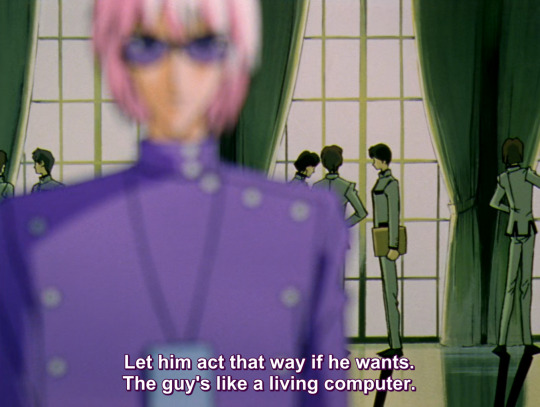
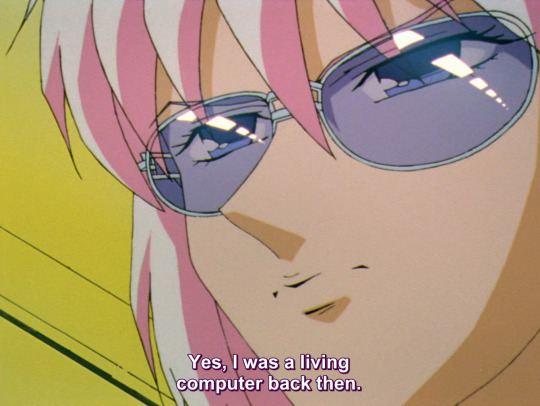
this is Mikage's eternal reality: his recollection of the past. even during the "present" of Utena's narrative, he is still walking through Nemuro Memorial Hall, which is why it's still standing, unburned. the Boys of the Black Rose that the audience sees are filtered through Mikage's memory; whether or not the boys really said these things about him is ambiguous. it's possible, but the important fact is that Mikage believes they did.
this transpersonal mirroring keeps Mikage trapped, unchanging. he feels himself defined as unable to connect with others, so he keeps away from them. this becomes a self-perpetuating cycle, leaving Mikage a total outcast.
even outcasts, however, are members of society. the Boys of the Black Rose actually have more in common with Mikage than the average Ohtori student. they're all scientists working on the same project. they have much of his coldness, sense of superiority, and intellectualism. the main difference is that they're the in-group.
while Mikage believes himself to be emotionless, it's made clear that his social isolation hurts him. he doesn't want to be set apart, but he doesn't know how to break through the barrier between him and others. it's very easy to do a queer reading of the character, given the way this is conveyed to the audience.
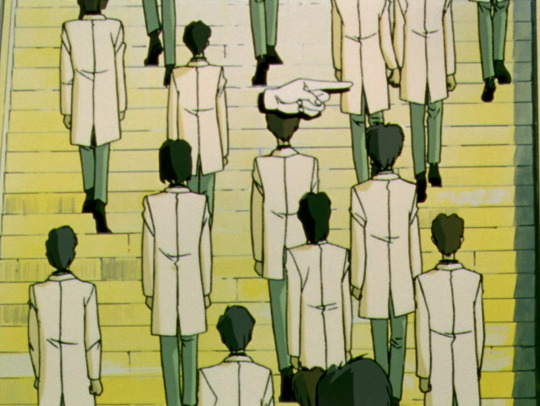
Mikage's fixation on Tokiko and Mamiya is easier to undestand with all this in mind. the world he was living in, occupied by the Boys of the Black Rose, was a cold and alienated one. in contrast, Tokiko has genuine passion, caring for her brother deeply. Tokiko's tears move Mikage, allowing his own buried emotions to break through the surface. but she also reinforces his social isolation; he is equally as hurt by her as he is drawn to her.
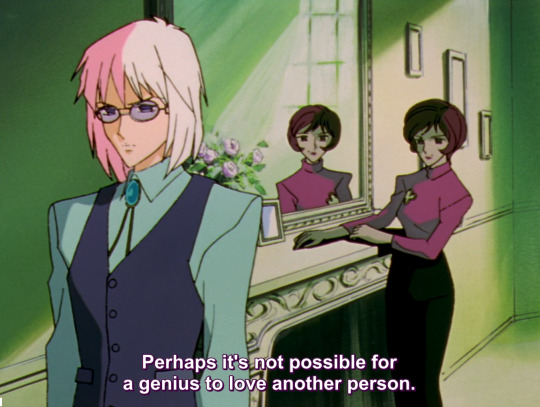
this is part of why Mikage is so determined to "defeat" Tokiko; she offered him hope of connection, but he was never able to "win" her, as men so often try to do with women.
Mamiya is something else altogether; a boy, like Mikage and the Black Rose Boys, but altogether different. warm, friendly to Mikage, not intimidated by his intelligence or reputation, and insightful. in a show full of characters obsessed with holding on (to the past, to a person, to their self-image), Mamiya is the only one who can see the wisdom in letting go.
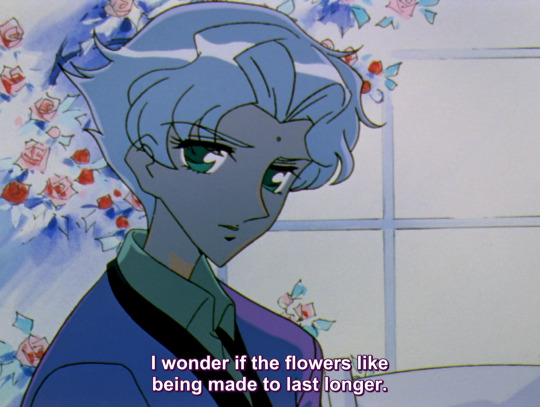
Mikage at first is open to Mamiya's words, preparing to call off their quest for eternal life. but like every character who threatens the system in RGU, he is faced with Akio. in a prototype of the later "End of the World" sequences, Mikage comes across the kissing Tokiko and Akio. this proves to be too much for him; there are some things he can't afford to lose.
the scene has significance to Mikage far beyond disappointment in love. he wanted to create a family with Tokiko and Mamiya; marriage to Tokiko would tie them together "forever." if he could be by Tokiko's side as they lost Mamiya, then at least he wouldn't be alone after his death. but if he's only Tokiko's coworker, when their work is done, he's back to being a computer.
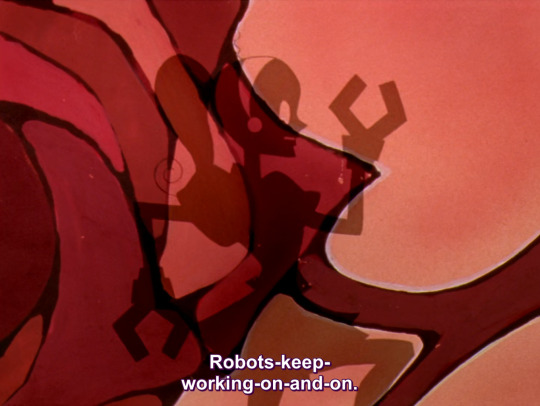
in desperation, Mikage plays into Akio's hands. under contract, he sacrifices the Boys of the Black Rose and burns down the hall that bears his name. when justifying himself to Tokiko, he claims that this act will allow them to attain eternity. in the events of the series, he's still at it: installing Mamiya as the Rose Bride will, after all, make him eternal, even though it's the very kind of eternity Mamiya wanted nothing to do with.
Mikage retreats into delusions on feeling the sting of Tokiko's rejection. though he is the one who betrayed her, he turns it around and feels betrayed himself. going even further, he casts Mamiya as the one who set the fire.
the Boys of the Black Rose are also used to emphasize his inability to face his own actions. throughout the arc, the boys are seen pushing coffins around. however, in episode 23, Mikage takes their place right before he is forced to face the truth about himself.
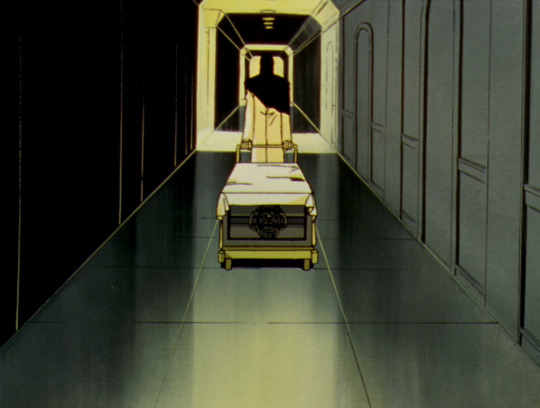
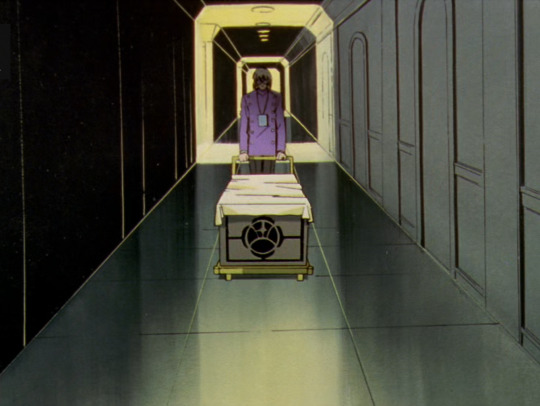
at the end of the arc, Miki claims that no one was hurt in the the fire, contradicting the previous story of Nemuro Memorial Hall. this possibly indicates that the murders are a figment of Mikage's imagination--the older Tokiko doesn't seem to react to him as if he's a murderer. more than anything, he seems guilty of self-denial and retreat from reality. Tokiko went on to accept Mamiya's death and even mourned for Mikage, while he ignored her in favor of his memories. the fact that he does not recognize her feelings is another aspect of his tragedy.
Mikage, through his fruitless revolution, loses the very things he always wanted. he attempts to throw away his past self, the cocoon of Nemuro hatching into the butterfly that is Mikage. with it, he burns away the boys who rejected him, who embodied the cold world he used to live in. he uses their sacrifice to enshrine Mamiya, idealizing him as the perfect companion. but as Ikuhara said, he was doomed to fail from the start:
Those who reject that place are, conversely, rejected by it as well. This is the nature of systems: the moment you reject them, you are forced to realize that they’re the very ground you’re standing on. Mikage noticed the trick behind the system, and he hurriedly attempted revisions. But the adult who’d created the system just said “Let’s not,” and unilaterally brought the curtain down.
the "trick within the system," is, I think, the fact that it's socially constructed. Mikage believed that on realizing this, he could simply remake the world as he wanted. he was allowed to do so for a time, when it was useful. when he ceased to be useful, he was dispatched with, because while he had operated within the system, he was not in control of it. and beneath his delusions, there was still a reality.
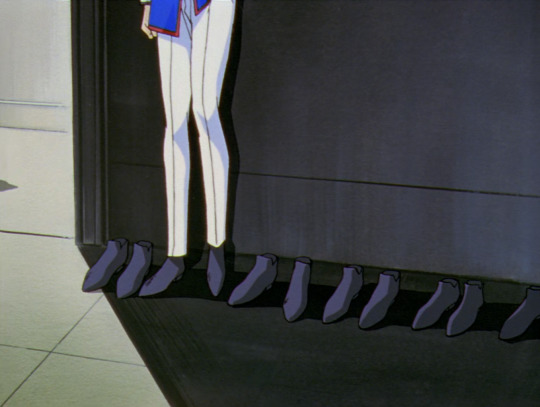
Mikage is the true Boy of the Black Rose: the true ghost, the true sacrifice, living in the desiccated world of a preserved flower. throughout the arc, he takes possession of Ohtori students who suffer from the same afflictions as him, and every time Utena defeats one of his duelists, another part of him is exorcised--another Black Rose Boy burned away. in the end, the only thing left of him is the ruin of Nemuro Memorial Hall, shown briefly in the final episode. he graduates at Ohtori, but only after losing absolutely everything. that seems to be the only way to step into adulthood: naked and shivering, like the day we are born.
149 notes
·
View notes
Text
thinking about nanami and touga both telling utena not to trust anthy at the end of the series. whilst nanami and anthy being friends is something that makes me bawl like a little baby and overjoys me immensely, ive never bought a reading of nanami post-32 that is anthy positive. like idk how you could get that impression when all she does is talk about how anthy is a terrible and dangerous person. she’s scared of her. and you know she shouldn’t be, but it’s understandable why a 13 year old living in ohtori academy might be scared of someone she already didn’t like after finding out something deeply traumatic regarding them and not having the tools to make sense of it in a compassionate way. and it makes me want to eat drywall
what’s really interesting about all this to me tho is how both kiryuus tell utena not to trust ‘the chairman/end of the world or himemiya anthy/the rose bride’. anthy and akio are a package deal of toxicity and harm to both of them and if that isn’t just the most fascinating thing ever. also the difference between nanami’s ‘chairman/himemiya’ and touga’s ‘end of the world/rose bride’ (nanami giving her warning during the badminton scene, touga giving his at the end of his duel. so much going on here wrt roles and settings and rituals and reality). but getting back to my real point isn’t it so cool (agonising) how nanami and touga are incapable of extending compassion or understanding to anthy despite the fact that they’re the two people who know the most about her other than utena and akio. and like. they don’t know a Lot, but theyve both had a smidge of insight into an abusive relationship that mirrors aspects of their own lives in myriad ways
idk something about the rose bride as a symbol who bears all of humanity’s hatred. and in the end all girls are like the rose bride yes, but key word here is like. an approximation; all trapped, all agonised, yes, but not all literally fucking crucified for eternity by a million swords that shine with human hatred. not abstracted in such a particular and insidious way. i always find anthy/kiryuu parallels compelling wrt issues of race and class and mannnnnn. nanami takes a step away from the duelling game. she’s not out, but she’s not actively partaking, not actively being exploited. touga, whilst a little more overtly involved in stuco business and still meeting with akio, does also take a step away. like, they’re both able to do that. it’s a bit of an artifice, sure, they’re still here, but oh my god oh my god oh my god. theyre not anthy. am i making sense can anyone hear me holy shit
i think what im trying to say is that for everything that both nanami and touga learn about ohtori academy and the people living in it, for everything that forces them to self-reflect and question the ground that they stand upon, they fail to break the chain with it. like, they too contribute to anthy’s abstraction. she’s an idea that they secretly embody/emulate (not sure which word works better for what im trying to say just yet), and not a person who shares experiences with them but is still wholly separate from them. this kind of compassion is like. it’s too hard, when you’re in the situations that all three of them are in. anthy too perceives both of them as nonhuman, but there is a crucial power dynamic at play here. how can you stomach such a kindness to someone you can only see as a poor imitation of the worst parts of yourself, whom you loathe??
^ THIS GUY loves it when characters commit acts of extreme violence against one another that they themselves have experienced. the nanamianthytouga brand
#big ramble tldr i am compelled by stabbing. lots of it. of the self and others (which are muddled by your misperceptions)#yum yum yum#dais.txt#obfuscation abventures
91 notes
·
View notes